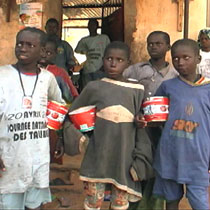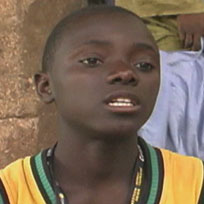-
(单词翻译:双击或拖选)
Dakar
08 May 2007
In the West African nation of Senegal, each day nearly 100,000 children pour into the streets to beg for money at the beckoning1 of their religious leaders. The use of child beggars, often as young as five years old, by Koranic schools has long been a part of Senegalese society, but some human rights groups say they want that to change. VOA's Kari Barber has this report from Dakar.
 |
| Senegalese beggar children |
Given up by their parents to be raised en masse at Islamic schools, the boys spend their days studying the Koran and begging on the streets. Teachers say begging and living in filth3 teaches the boys humility4.
The money they earn goes to their teacher. The boys must beg for food. A sick child lies alone in a room where dozens of boys sleep each night.
Begging on the streets can be a dangerous life. In his native language, 15-year-old Mamadou Ba describes his days. "I don't have enough time. I get up at four o'clock in the morning. I study the Koran and pray until seven, then I beg until 11. Then I study the Koran again until two, and then I have until three P.M. to beg for food. Then I study the Koran until five, then I beg again on the streets until nine and hope for something to eat."
Some in Senegal are calling for an end to putting children on the streets to beg. Malick Diagne is the coordinator5 for the human rights group Tostan. "This is something that shames us as Senegalese because when you come to Senegal, one of the first things that shocks you is that very pitiful situation in Senegal."
Scores of activists6 participated in a five-day march against child begging. Former Talibe, wearing yellow shirts, joined them.
Gora Mbaye was a Talibe until recently when he was taken in by an organization that provides homes for former Talibe. "My life has changed a lot. I used to wake up early to beg, now I no longer have to beg. I no longer beg for food either. I'm not so tired anymore"
 |
| Gora Mbaye |
The practice of raising boys as Talibes has long been ingrained in Senegal's deeply religious society, and many say it is unlikely to change.
Koranic teacher Abdou Khadri Sow was a Talibe when he was young, and his father before him. He says he does not like making the boys beg, but he needs the money.
"I am not happy about the children begging either,” he says. “It brings me no pleasure to send them into the streets, but my situation is difficult and I don't have any money."
The boys say they are often scorned by people who are annoyed by their begging and appalled7 by their filthy8 appearance.
Despite this, many say when they grow up they want to be Koranic teachers. They say they are proud to be Talibe, but they just want enough to eat, clothes, clean water and a life off the streets.
 收听单词发音
收听单词发音
1
beckoning

|
|
| adj.引诱人的,令人心动的v.(用头或手的动作)示意,召唤( beckon的现在分词 ) | |
参考例句: |
|
|
|
2
disciple

|
|
| n.信徒,门徒,追随者 | |
参考例句: |
|
|
|
3
filth

|
|
| n.肮脏,污物,污秽;淫猥 | |
参考例句: |
|
|
|
4
humility

|
|
| n.谦逊,谦恭 | |
参考例句: |
|
|
|
5
coordinator

|
|
| n.协调人 | |
参考例句: |
|
|
|
6
activists

|
|
| n.(政治活动的)积极分子,活动家( activist的名词复数 ) | |
参考例句: |
|
|
|
7
appalled

|
|
| v.使惊骇,使充满恐惧( appall的过去式和过去分词)adj.惊骇的;丧胆的 | |
参考例句: |
|
|
|
8
filthy

|
|
| adj.卑劣的;恶劣的,肮脏的 | |
参考例句: |
|
|
|















